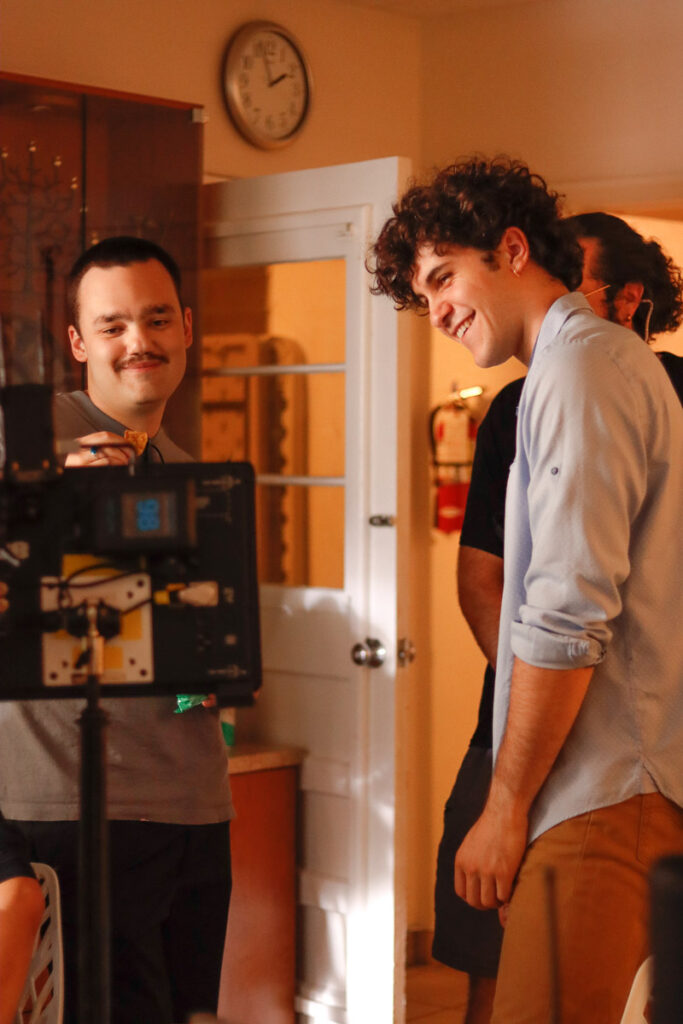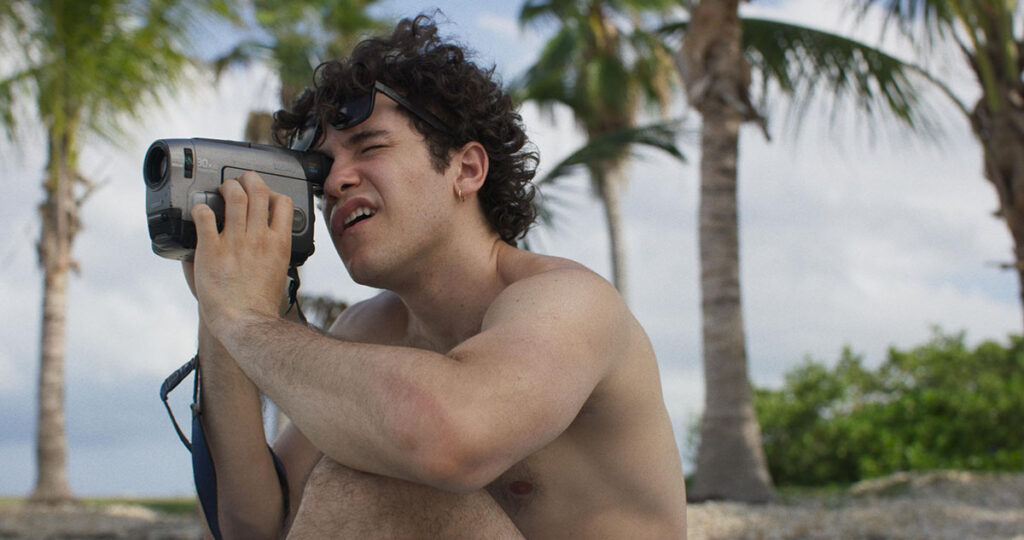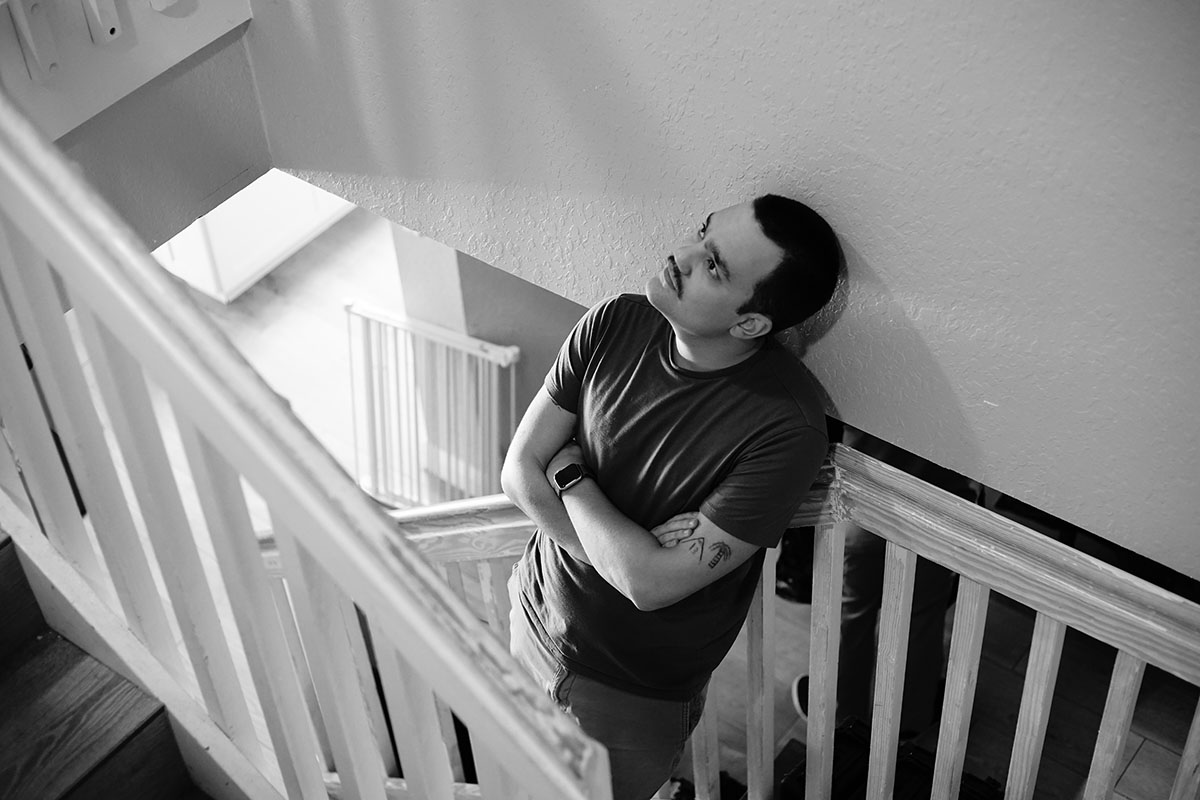After years of writing, producing, and directing short films, not to mention programming and launching two festivals (SunPass and Anita’s), Chris Molina premiered his first feature Fallen Fruit this March at the Miami Film Festival. It’s a queer story about Alex (Ramiro Batista), who moves into his childhood bedroom after a breakup in New York. Struggling to pull himself together as the threat of a hurricane looms over Miami, Alex seeks solace through a camcorder and Chris (Austin Cassel), a man he meets cruising the woods.
A Miami native myself, I met Chris Molina way back in 2016. This summer, Chris was home, preparing for the West Coast premiere of Fallen Fruit in San Francisco on June 26 as part of Frameline Festival. So I called him up to talk more about his work.
I wanted to know what inspired him about Miami and how being from a place so identified with tourism and escapism has skewed his perspective. “It makes me reflect on what spaces mean to different people,” said Molina. “I grew up in the suburbs, so I didn’t feel that. Now, I have friends that see it as a place where they can bunk with their parents, hang with their friends, go to the beach. They’ll text me on a Tuesday night like ‘Hey! You coming to Space?’ No! I have work in the morning! I live here!”

He continued, “People have been saying they get the full Miami experience [from the film]. Granted, most of these people are from Miami. But they’re seeing their Miami. Feeling the heat, smelling the smells, tasting the food. They’re feeling the water.”
Fallen Fruit contains metatextual layers. Molina’s voice makes an appearance in the film through a voicemail as the protagonist’s ex-boyfriend from New York. Interestingly, Alex’s main love interest in the film is named Chris as well.
When I asked Molina about that choice, he said, “I didn’t want to think of names. It ended up like this older version of me giving advice to the younger version of me. That’s really what it is. It’s something I wish I could mail to 19-year-old me.” Molina continued: “Then, I ended up casting the most charming actor in the role. Now it looks like I named this fantastic person after myself.”
There seems to be an increasing number of films blurring the line between fact and fiction, a trend Molina ascribes to vulnerability, adding “Audiences have a yearning for that. They want to connect with art that bares the soul. I don’t know how to create unless I’m taking from my own personal life. I’m jealous of James Cameron. I could never make Avatar. I don’t know how to make art that isn’t taken from my life.”
That personal experience is exemplified in one of the film’s centerpieces, Alex goes to Twist (an iconic South Beach gay club) the night before a hurricane and sings Maybe This Time from Cabaret. “We filmed that on a Monday. The Friday before, my producers came up to me: ‘Hey, we know you want to use this song, but getting the rights is really expensive,’” Molina remembers. “Usually I’m willing to talk through things, but it was one of those moments where I was like ‘No. It has to be this song.’ I’ll do what I have to do to make it happen. That song meant a lot to me. I think it perfectly encapsulates what he’s feeling at that moment.”
What is it like to him to balance his vision with a limited budget? Molina says “I think I’m lucky I’m not trying to make Avatar.”

As well as being a filmmaker in his own right, Chris Molina is a short film programmer for the Miami Film Festival and has founded two independent film festivals in Miami. He started SunPass in January 2021, creating a community for local filmmakers during the COVID lockdowns. “I created this virtual festival for people who are starting to have a platform to show their work,” Molina said. “I remember those first festivals that played my movies and made me feel what I was doing was worthwhile. I want to give people that feeling.”
Molina then launched Anita’s Film Festival the following summer during Pride Month. This queer film festival takes its name from anti-gay activist Anita Bryant who was notoriously pied in the face. “[Anita’s Film Festival] was a response to the anti-queer laws all over the South. There needed to be a space for people to show art and feel supported by each other.” Molina said. “Sometimes it feels like the community is segregated. There’s lesbian bars, gay nightclubs, trans nights. There’s rarely events that feel inclusive to everyone in the queer spectrum.”
Through all of this work, what does Chris Molina want to see? “I’m not looking for perfect films. I’m looking for something that only this filmmaker can do that needs to be encouraged,” he said.“I’m looking for films that represent the diversity in Florida. Not the Florida our government tries to tell people we are. The Florida I know.”

